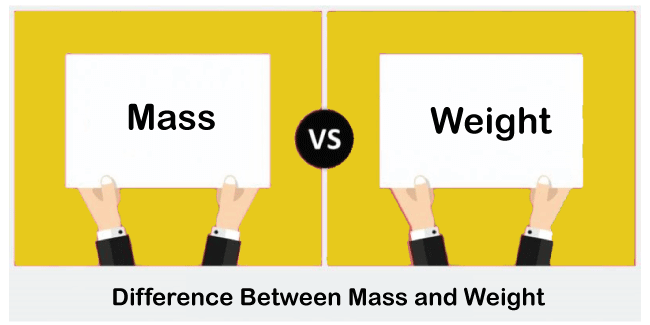Difference between Mass and WeightDefinition of MassMass is a physical quantity that indicates the total amount of matter or substance in an object. Mass is the basic property of an object that calculates the object's resistance to acceleration when an external force is applied to it. Mass is represented by M or m. The S.I unit of MassMass is the kilogram (Kg). Mass is a quantity that tells us how much force is required to move an object from one place to another.
F = ma
Where, F = Force m = Mass a = Acceleration The Mass formula is given as,
Mass = Force/ Acceleration
If the acceleration itself is the gravity, then M = F/g Where, F = force G = gravity. Definition of WeightWeight is the force exerted by an object with MassMass when acted on by a gravitational field. Weight is related to MassMass but will very proportional to the strength of the gravitational field. Mass remains consistent, even in a zero Gravitation (G) environment, but there is zero weight in zero Gravitation(G). Weight is denoted by W. Weight is nothing but mass time's acceleration due to gravity.
W=m x g
Where W = Weight M = Mass g = Acceleration due to gravity It is considered as a force acting along the center of gravity (point) of any object. The Mass of an object is constant while weight which depends on gravity varies. Hence, if the weight of a person on earth is 'p.,' Then his weight on the moon would be less than 'p just because the gravity is very weak on the moon. 
Mass is directly proportional to weight; it means the greater the MassMass of something, the greater is its weight. Although, the primary difference between the MassMass and the weight refers to MassMass is constant, while the weight of an object changes as it relies on how far the object is from the center of the earth.
Next TopicDifference between
|
 For Videos Join Our Youtube Channel: Join Now
For Videos Join Our Youtube Channel: Join Now
Feedback
- Send your Feedback to [email protected]
Help Others, Please Share










